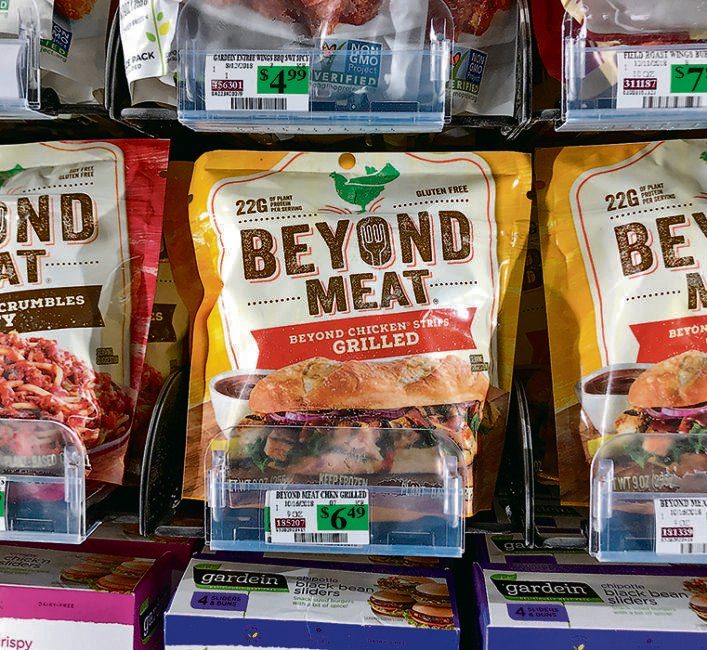Plant-based protein booms | The Western Producer

Canadian grocery buyers continue to gravitate toward processed vegetable protein products as the prices for “alternative meat” and “alternative dairy” products become more accessible relative to steak, chicken, pork and dairy.
Sylvain Charlebois, a prominent food scientist and director of Dalhouise University’s Agri-Food Analytics Lab, said the value of Canada’s vegetable protein market continues to grow and shows no signs of slowing
“The market, overall, is very promising,” said Charlebois during an April 27 web event hosted by Protein Industries Canada (PIC).
“The vegetable protein market in Canada was worth almost $300 million at the end of 2020, but the expansion and growth is so significant that we actually are expecting that market to reach $1 billion by 2025.”
“There’s lots of signals … telling us actually that Canadians are going to be (paying) more attention to vegetable proteins than ever before.”
Charlebois was recently commissioned by PIC to complete a report on trends in Canadian grocery aisles and factors driving consumer interest in processed vegetable protein products.
The mandate of the report was to gain a better understanding of Canada’s plant-based food market over the next five to 10 years.
Citing figures from NielsenIQ, Charlebois said Canadian consumer spending on meat and dairy alternatives rose 31 percent in 2020.
The volume of sales rose 25 percent.
At least 20 different brands had annual Canadian sales in excess of $3 million last year.
The top-selling brands included Yves (Hain Celestial) with Canadian sales exceeding $62 million (up nine percent from 2019), Sunrise (Sunrise Market) with sales of $28.5 million (up 35 percent), Gardein (ConAgra) with 2020 sales of $24 million in Canada (up 38 percent) and Beyond Meat with sales approaching $23 million (up 134 percent).
Kellogg’s Morningstar Farms brand saw a 105 percent year-over-year increase in Canadian sales.
In his online presentation, Charlebois said more Canadian consumers are taking note of the trend toward greater consumption of vegetable protein products.
Grocers are also responding.
In supermarkets, the vegetable protein section is expanding and it’s getting closer to the meat counter, Charlebois said.
Canadians are still buying meat, he added.
According to NielsenIQ, national retail beef sales were up eight percent by volume in the 12 month period ending Jan. 31, 2021, retail chicken sales were up nine percent by volume and retail pork sales were up 12 percent.
But there are signals that an increasing number of Canadians are open to experimenting with alternative meat and alternative dairy products, based on financial accessibility or personal preference.
Changing social norms are influencing consumer behaviour at the grocery store.
An estimated 2.5 percent of Canadians — roughly 500,000 people — are vegan and, in recent years, the concept of veganism has become “socially normalized,” Charlebois said.
Even consumers that are not opposed to eating meat are being influenced by the growing vegan trend.
New York publisher and global media company Condé Nast recently announced that it will no longer include new beef recipes on its popular online cooking site, Epicurious.
Condé Nast, whose publications include Vogue, GQ, Vanity Fair and The New Yorker, cited environmental concerns associated with beef production.
“Our shift is solely about sustainability, about not giving airtime to one of the world’s worst climate offenders,” the company said.
Charlebois said Canadian consumers are “still committed to meat consumption overall” but he conceded that consumer trends are changing, particularly among younger grocery buyers.
“There’s a lot of signals out there basically discouraging consumers from eating beef because of environmental concerns,” he said.
Education is needed to help consumers differentiate between different methods of beef production, some of which have no negative impact on the environment.
Grocery prices will also impact buying choices.
Relative to meat products that are available in the frozen section or fresh meat aisle, the prices of vegetable protein alternatives are becoming more affordable.
Overall, Canadian grocery prices are projected to increase by an estimated five percent in 2021.
“This year is going to be challenging,” said Charlebois.
“We’re looking at a food inflation rate of five percent, which is a lot.”
“Frankly, this is going to be problematic for consumers looking for a protein fix and as meat counter economics become more complicated, we actually expect vegetable proteins to become much more accessible financially.”
“There are some really good (vegetable protein) deals out there and if you can’t afford that steak, that chicken or that pork, maybe once in a while you’ll go for that vegetable protein option.”
The potential for dairy alternatives, particularly oat-based products, is also showing promise, Charlebois added.
Consumers like the way oat-based dairy alternatives behave in coffee and in different recipes.
Oat products are also becoming more affordable than dairy alternatives produced with soy or almonds, de added.
“We are seeing some great potential with oats.”
“We are expecting oat (products) to probably gain more momentum and to gain market share from almond over the next five to 10 years.”

